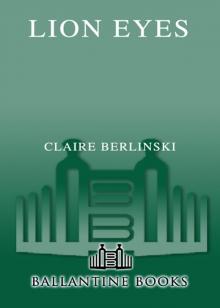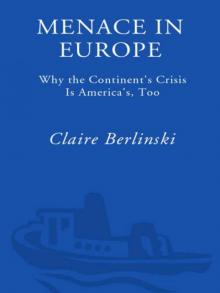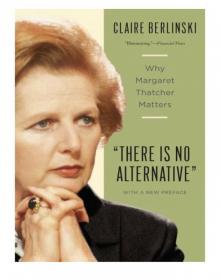- Home
- Claire Berlinski
There is No Alternative Page 10
There is No Alternative Read online
Page 10
I interrupt: “You say you really felt put at a disadvantage by her femininity, and yet she was willing to use that when it—”
“True. Yeah, yeah, yes.”
“Let’s talk about the kind of femininity that she used. I keep hearing various accounts of this.”
“Yes—”
“You know, that she was fully capable of flirting and flattering to get her way. Did you see that in action?”
“Um.” He manages to convey an arctic tundra of distaste in that syllable. “I saw her doing it with others.” He snorts. “Not my type o’ lady.”
Kinnock remembers her trying it on him, though, in meetings about Northern Ireland. “You were meeting with her one-on-one?” I ask.
“Yeah, well, there would be some civil servants. Maybe a soldier there, or a security expert. And if she had some difficult requirement, some way where she really wanted cooperation, and they thought I might have interpreted it as a political step too far—I never did—she’d take her shoes off, and sort of curl her legs under her on an easy chair, and offer me whiskey. And I used to think, ‘This is bloody pathetic.’ I mean, here’s a woman in her sixties. I mean, I know why she did it—because it worked with other people, you see—”75
“That’s the odd thing,” I break in. “I’ve spoken now to a number of people, a number of men, all said, ‘Other men found her attractive.’ But not one will admit, ‘I found her attractive.’ So who was it who found her attractive?”
“Well, you know, there are people who wrote about it, you know—Mitterrand.”
“Yeah,” I agree. “And Alan Clark. Yeah.” (“But goodness,” wrote Clark, “she is so beautiful; made up to the nines . . . quite bewitching, as Eva Perón must have been. I could not take my eyes off of her and after a bit she, quite properly, wouldn’t look me in the face.”76) Of course, there is no sexual desire to which Alan Clark wouldn’t have admitted. This was the man who in his diaries—not published posthumously, but while he was still alive and married—describes with priceless gusto bedding a South African judge’s wife and her two daughters. At the same time.
“Well,” Kinnock says, “a couple of people have written about it. And, you know, I saw her being what I suppose you’d call coquettish to other people at receptions and whatnot.”
“It’s not just sexiness,” I say. “It was also the maternal archetype. I keep getting the sense that people responded to her as a stern mother, a stern schoolmistress—”
The matron. We should linger for a moment on this image; the full dimensions of it may be obscure to the American reader. Men of Margaret Thatcher’s generation who attended the public schools were apt to have grown up under the matron’s influence. George Orwell described the matron thus in Such, Such Were the Joys:I think it would be true to say that every boy in the school hated and feared her. Yet we all fawned on her in the most abject way, and the top layer of our feelings towards her was a sort of guilt-stricken loyalty . . . Whenever one had the chance to suck up, one did suck up, and at the first smile one’s hatred turned into a sort of cringing love.77
Neil agrees. “Yeah, yup. No, honestly, she had that characteristic, so that there was a very widespread feeling, at many times, that ‘She was wrong, but she was strong.’”
Why, I ask him, were the British so susceptible to that characteristic? I don’t venture a theory, but he seems to think I’m advancing one. “I think that’s pop psychology went mad,” he says. “I think that’s complete bullshit. I think there’s a certain amount of—”
“You think asking the question is bullshit, or—”
“I don’t think that countries, mature countries have national moods like that, looking around, sucking our thumbs, waiting for cuddlesome old mothers. That’s just not the way it works.”
Now, I haven’t said anything of the sort, and the fact that he spontaneously injects the word “mother” into our discussion of Thatcher—and then dismisses the relevance of the word he introduced with such disproportionate indignation—strikes me as re-vealing, not about Thatcher or about the British nation, but about Kinnock himself. In fact, I encountered among almost all the male politicians to whom I spoke an almost violent antipathy to what seems to me an obvious psychological observation, one that anyone with the remotest degree of insight into human nature would accept: The way people react to a very powerful, middle-aged woman is apt to suggest something about their relationships with their mothers. I am not exactly casting a laser-light of fresh psychoanalytic acumen on the situation by suggesting this. Yet every time I even hinted so, the man to whom I was speaking reacted as if I had just said that I sensed a blockage in his heart chakra. I am not sure what to conclude from this, except, perhaps, that men who rise to the top of the power game tend to be men of action, not introspection.
“There is a segment of the Conservative Party,” Kinnock concedes, “whose main contacts with females in their formative years was with a matron at their public schools, and I don’t think you’d be stressing psychology too far to say that there were some who regarded her as Maggie the Matron, and were consequently exceedingly joyous if she showed them any kind of favor or even notice. Now, I wouldn’t say it was more than a segment, and I certainly wouldn’t say it was true of all the ex–public schoolboys. But some.”
“Yes,” I agree. “I’ve noticed that among some of the men I’ve spoken to, some of them are still nursing wounds, still nursing injured pride about slights from her, how she didn’t notice their brilliant report or whatever—”
“Yeah, it’s poisonous. I’m almost relieved by the fact that my dislike of her was absolutely constant. It never varied. I never needed a damned thing from her.”
Several more times during our conversation, he tells me that he simply couldn’t figure out how to attack a middle-aged woman without looking like a cad. He says this as if menopause were an illegal weapon. “The feeling I’m getting,” I say to Kinnock, “is that you did not feel that she played fair.”
“Oh, Christ, this is politics!”
“I know.”
“No, this is not boxing under the Queensbury rules, and it’s not association football! This is a blood sport!”
“Well, then, how come you weren’t willing to really stick it to her? I mean, you’re saying, ‘I didn’t want to use discourteous language, I didn’t want to be seen attacking a woman older than me,’ but if this is a blood sport, why didn’t you?”
He sighs. I feel a bit cruel now, as if I’m not playing fair myself, but I really do want to know how he explains this to himself. “Well, like I said,” he answers at last, “it would have been politically disadvantageous—but in any case, it would have bloody demeaned me to have done that. If you’re doing it, you know, toe-to-toe with a fellow about your age, or even if he’d been a bit older than myself, that would have been—”
“So you’re basically saying, ‘I couldn’t hit a girl.’”
“Well, I know I couldn’t hit a girl—”
“Yeah, but you know, she happened to be the prime minister. And you felt that you couldn’t hit back? Because she was a woman?”
“Not that I couldn’t hit back, I mean, I did hit back!”
I am left, in the end, with two images—a small boy of about three, red-haired, pink-faced, hiccupping as he fights back tears, staring into the looming face of an impossibly large woman in an apron. If you don’t eat your meat, you can’t have any pudding! How can you have any pudding if you don’t eat your meat?
And then, the image of a beleaguered middle-aged man with a thin fringe of wispy pumpkinish hair, lying on the psychotherapist’s couch.
“My mother,” he is saying, “was a formidable woman.”
Let’s return now to John Hoskyns—remember him, the wiring diagram? We have been talking about economics and the miners’ strike over lunch at the Travellers Club, but it is time to repair to the tea room, where his wife, Miranda, has arrived to join us. I have spoken to many men who knew Thatcher, but thus far n
o women: Miranda is the first. She is also the only interview subject to show even the remotest curiosity about me. She wants to know about my family, how I came to be a writer, why I live in Istanbul. Her feminine curiosity makes her to my mind an interesting witness. It suggests that she might pay attention to things in a way powerful men tend not to do.
I tell Miranda that I am so glad she joined us. I had been hoping for a woman’s perspective on Thatcher. She laughs, seeing right through me, and turns to her husband. “She’s hoping to get some gossip!”
“Gossip?” says John, as though it would never have occurred to him.
“Yes!” says Miranda.
John raises an eyebrow. “We never used to talk about anything except economic theory, did we? The Laffer Curve featured largely.”
Miranda permits herself a Mona Lisa smile. “If you’re occasionally allowed amongst these august presences,” she says, “you can be a fly on the wall, as it were, as a wife. Which is awfully useful.”
“Let’s start with your first impressions of her.”
“Well,” she says, “I was very left-wing, in the early ’70s. John and I used to argue. I was an artist, and all of my friends—”
“I’ll absent myself while she makes these confessions,” says John, chastely sipping his coffee. “I mean, she was an absolute Marxist.”
“No, I wasn’t a Marxist. Well, we used to have these violent arguments about politics . . . John and I used to argue at breakfast, and unfortunately his logic was so much stronger than mine that he eventually talked me out of it. So when he sold his company and decided he wanted to go into politics, I was appalled. Because a lot of people wanted him to get a seat. And I was horrified, because I didn’t know how I was going to explain it away to everybody. But I was beginning to understand what he was talking about. And I suppose it was after you met Keith Joseph that I first became aware of Maggie—it must have been about 1975, was it? I think I had seen pictures of her—she was known as Thatcher the Milk-Snatcher. I became aware of her and thought she was pretty awful. I really did. She wasn’t my kind of woman at all—”
“‘Pretty awful’ how?”
“She represented everything having to do with my own parents’ generation. To do with middle-class values, behaving properly, wearing hats—all the kinds of things that I was longing to throw away. Because the ’60s—although I was already married and having children—in the ’60s, I was thrilled with everything being overthrown, you know, all the terrible fuddy-duddy stuff. I didn’t want a royal family anymore, you know, freedom for everybody—I really thought it was wonderful! I wasn’t involved in it very much, but seen from the outside I thought it was a very good thing. And she represented, as she did to everybody on the Left, the absolute antithesis of that. She had nothing to do with that world of the ’60s. And I was in a very uncomfortable position, because I was beginning to see that John was right about what he was saying, or at least my brain told me he was right. My emotions told me he was all wrong, and he didn’t understand. He kept saying, ‘How do you think somebody like me, who’s an entrepreneur, can possibly make his way in the world with taxes and everything like that,’ and I kept arguing back, ‘Well, it’s your choice, you do it because you like doing it, you don’t mind about profits, they don’t matter,’ you know, all that sort of stuff. I mean—I was pretty silly.”
John nods wisely.
“But he was beginning to persuade me that he was right,” she continues. “So I was in this position of seeing this awful woman, knowing that she thought the same sorts of things as he did, and I had to be gradually converted over—and by the time she was likely to win in 1979, I was a terrific fan! I thought she was the most courageous and wonderful woman, and I was longing to get to know her.”
“Was there a moment in particular where your feelings began to change?” I ask. “Was it something that she said while campaigning, or—”
“I can’t remember exactly what it was, but there was a moment when I realized that she had a courage that nobody else seemed to have. And I admired the courage more than anything. I still deplore some of the things she stood for, but I admired her courage more than anything.”
“What do you deplore?”
“She’s—quite narrow-minded. She doesn’t like women. She doesn’t like women who—um—impinge on her life in any way. She’s absolutely charming to women who work for her, who, you know, waited on her in Chequers, in London. She was delightful with children, delightful. Absolutely charming to children—”
“Genuinely sweet—” says John.
“Oh, genuinely!” she agrees.
“Completely un-self-conscious, not—”
“Oh, absolutely!”
“Not knowing she was being observed, or—”
“Yes!”
“Very touching, that way.”
“One of my biggest memories,” says Miranda, “was this very touching way that she took this little boy, and I was just standing nearby, and she said”—Miranda’s voice becomes gentle and coaxing, like Mary Poppins—“‘Now, come along, shall we go to the kitchen? What’s your favorite food?’ And she walked out of the reception, and apparently got his favorite food, whatever it was. It was really lovely.”
“Lovely,” John agrees.
“But she didn’t like women,” she says. “And I wasn’t the only one to feel it. Nearly all the wives—I mean, I remember Peter Hennessy saying, ‘Those wives are going to get out their knitting needles one day!’”
“Why do you think she didn’t like women?” I ask.
“Because they were a threat to her. Because on one level, she was an attractive woman—”
“Yes,” agrees John in the slightly abstracted way of a man who hadn’t really thought about it before.
“I mean, there were some men, William Whitelaw, for instance, who found her dazzlingly attractive, and apparently when drunk made passes!” William Whitelaw was Thatcher’s deputy prime minister. She found him an invaluable source of support, famously announcing that “every prime minister needs a Willie.” She apparently said this in perfect innocence and had no idea why everyone found it so funny.
“Who did?” says John, suddenly curious.
“William Whitelaw!” she replies, pleased with herself.
“Oh, really?” says John.
“He supposedly said to her, ‘I’m in love with you!’”
John looks surprised. “Did you have a long conversation about it with Willie?”
“This is gossip! This is gossip! I didn’t, no.”
“Certainly, he got terribly emotional about her,” says John.
“Terribly emotional!” agrees Miranda.
“Saying, ‘She is the only—’”
They are talking over one another now, and I can’t catch what they’re saying. No matter. We have a a solid piece of unsourced gossip: Willie Whitelaw was in love with her. So was her parliamentary private secretary, Ian Gow, according to Alan Clark, who describes Gow’s devastation at being supplanted by another in the prime minister’s affections. “How ruthless women can be,” Clark laments. “Far worse than men. Ian was completely in love with the prime minister and utterly devoted to her.”78
Miranda too was utterly devoted to the prime minister, and she too suffered her share of indignity. “I mean, I really came to the point where I really would have done anything for her. I thought she was so marvelous, and she just simply treated me like dirt.” She says this with no rancor—she seems to suggest with her voice that it was just one of those peculiar things about Margaret Thatcher, and nobody’s perfect. “And I came to the conclusion at the end that it was because at some of these gatherings and parties, I’d been in a group, with one or two other people, and we were all having a lot of fun. And she thought she wanted that fun, with the men, but she didn’t want the women there. It was something like that, some peculiar thing—”
“One of those female types,” I say, “and we all know them, who likes to be the center of mal
e attention—”
“Absolutely!” says John.
“That’s it,” says Miranda simultaneously.
“Absolutely,” agrees John again, nodding vigorously.
“And there was one occasion,” Miranda recalls, “when she literally, when I was saying good-bye, literally—she used to do this to a lot of people—she’d take your hand to say good-bye, and you were just hoping to have a word or two, to say thank you—and she’d just sweep you out, and wait for the man to come—it’s very, very weird.”
“Like some old-fashioned Hollywood diva,” I say.
“Yes! Yes!” agrees John.
So what was it like, I ask, when this diva entered the room?
“She’d always be very correctly dressed,” Miranda says, “with all the jewelry in the right place.”
“Quick,” adds John. “A quick, funny, shuffling walk. Comes in through the door at very high speed and immediately shows off like mad to show she’s arrived—”
“Yes, shows off! She was a great shower-off. I mean, at the end of parties, when you were invited to stay and have a drink with her before she went off to the House of Commons, she would throw off her shoes, and sit down on the sofa with her feet up, and everyone would sort of cluster ’round her—which I used to feel very uncomfortable about—you know, everyone looking at her with worship. And she just showed off. Non-stop. Again, back to the diva, you know. Very much that sort of thing. But I’m thinking back to when I actually met her. John—I was hoping I would have met her the night of the election, when we were around at—um—Central Office?”
“Central Office,” he agrees.
“Once it became clear that she was in, and she was going to be elected, John came ’round and said, ‘OK, let’s go home and watch it on television.’ And I said, ‘But I’ve never met her!’ He said, ‘I don’t care, I’ve got to get out of this.’ And as we left, all the newspapermen outside the door, saying, ‘She’s coming! She’s on her way!’ And I couldn’t get back in again! I had to go home and watch it on television! I missed the whole thing. So I didn’t meet her until well after that. And she took hold of my hand, in a very friendly way, and said”—here Miranda breaks into a perfect impression of Thatcher’s imperious, regal voice—“‘Oh, well, I do hope you can spare your husband. You’ve got lots of things you like to do yourself, haven’t you.’ She didn’t ask me whether I had, she told me!”

 Lion Eyes
Lion Eyes Menace in Europe: Why the Continent's Crisis Is America's, Too
Menace in Europe: Why the Continent's Crisis Is America's, Too Loose Lips
Loose Lips There is No Alternative
There is No Alternative